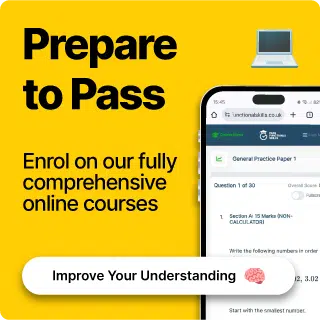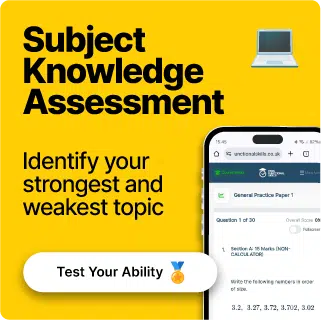Writing: Tenses
Tenses
You will need to understand and recognise the different tenses in the English language and know how to use them correctly.
Different tense markers are attached on to verbs.
Make sure you are happy with the following topics before continuing:
Verbs
Verbs describe an action, an occurrence or a state of being.
For example:
- Action:
e.g., “Sam kicks the ball”
- Occurrence:
e.g., “The party takes place on Friday”
- State of being:
e.g., “Lionel Messi is a footballer”
Follow Our Socials
Our Facebook page can put you in touch with other students of your course for revision and community support. Alternatively, you can find us on Instagram or TikTok where we're always sharing revision tips for all our courses.
Present Tense
The present tense is used to describe something in the current moment.
Most verbs follow this present tense pattern:
I/you/we/they – play
He/she/it – plays
Past Tense
The past tense is used to describe what has already happened. Most verbs add ‘-ed‘ to the end to turn into the past tense. For example, ‘I play’ in the present becomes ‘I played‘ in the past.
If the original verb ends in an ‘e‘, a ‘d‘ is added.
However, some verbs are irregular which means they don’t follow this pattern.
The following are some of the most common irregular verbs:
- I do –> I did
- I have –> I had
- I see –> I saw
- I go –> I went
Future Tense
The future tense is used to describe something that hasn’t happened yet.
There are two ways to structure the future tense:
BE + going
For example: ‘I am/he is/they are going to play’
Will
For example: ‘I/he/they will play’
Tense Consistency between Verbs
If there are multiple verbs within the same sentence, they usually need to be in the same tense.
For example:
‘When I walked to the shop, I had my coat on’.
Both verbs in this sentence are in the same tense when talking about the actions that happened at the same time.


Tense Consistency between Verb and Subject
The subject of the verb must agree with the tense of the verb.
For example: ‘Sam kicks the ball’.
In this sentence, ‘kicks’ has a singular tense marking so the subject of the verb must be singular, which it is (Sam).
If the subject of the sentence changed to ‘Sam and Josh’, then the verb has to change from ‘kicks’ to ‘kick’ to match this change.
Common Mistakes
When describing an action in the past, ‘have‘ always needs to be written before:
‘been‘ and ‘done‘
For example:
- ‘I have been to the shops’
- ‘I have done the work’
= ‘I been to the shops’ and ‘I done the work’ are NOT grammatically correct.
= ‘Could have’ and ‘should have’ are always contracted to ‘could’ve’ and ‘should’ve’ respectively.
= ‘Could of’ and ‘Should of’ are NOT grammatically correct.
Additional Resources
Exam Tips Cheat Sheet
FS Level 2Specification Points Covered
L2.21 – Use correct grammar (e.g. subject-verb agreement, consistent use of a range of tenses, definite and indefinite articles) and modality devices (e.g. to express probability or desirability)
Writing: Tenses Worksheet and Example Questions
Writing: Tenses L2
FS Level 2NewOfficial PFSRevision Products
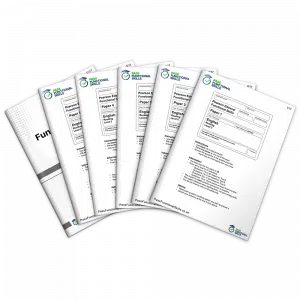
Functional Skills English Level 2 Practice Papers
This comprehensive set of 10 Functional Skills English Level 2 Practice Papers (5 reading papers + 5 writing) is a great way to revise for your upcoming reading and writing exams. These papers have been specifically tailored to match the structure, format and question types used by each of the main exam boards for functional skills English.
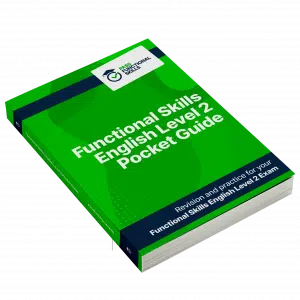
Functional Skills English Level 2 Book
Revise and practice for your functional skills English level 2 exam. All topics covered in this compact functional skills English level 2 book.
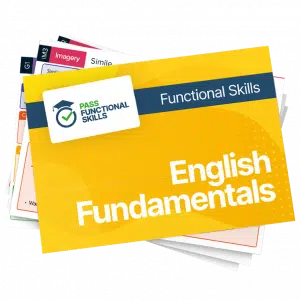
Functional Skills English Level 2 Revision Cards
Revise for functional skills English level 2, with these English level 2 fundamentals revision cards. Covering the building blocks of the essential areas of the level 2 exam.







